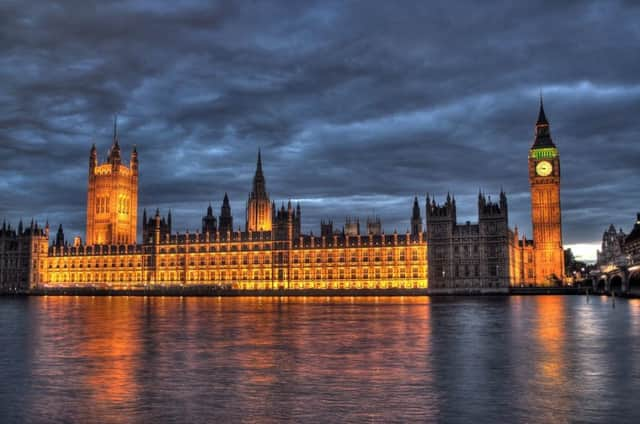Is the Great Repeal Bill a power grab by Westminster?


The most substantive exchange came from a question from Patrick Harvie, Green co-convenor, who wanted Nicola Sturgeon’s opinion on the Tory Government’s ‘Great Repeal Bill’.
Ms Sturgeon said that she wanted ministers to pledge to not repatriate powers already devolved to Holyrood, and that some repatriated from Brussels should automatically be devolved to Holyrood.
Advertisement
Hide AdAdvertisement
Hide AdThe First Minister suspected, she said, that the Tories in Westminster were planning a power grab on the Scottish Parliament.
With language more intemperate than she usually deploys, the First Minister said that it would be unacceptable for Labour to be ‘subservient’ to the Tories.
Mr Harvie also claimed that the UK Government had pledged to write into law the permanence of the Scottish Parliament and then reneged on that promise.
But just how likely is that power grab? And what effect would that have on the Scottish Parliament?
The Great Repeal Bill
The UK’s domestic legislative approach to the exit from the European Union is twofold – repealing the 1972 European Communities Act which took Britain into the Union, and automatically converting EU law into British law.
The name of the Great Repeal Bill is something of a misnomer, because it doesn’t actually start to repeal the regulations and legal frameworks so loathed of Brexit backing politicians.
Nor is the conversion of EU law into British law entirely as simple as it sounds.
The House of Commons Library described the undertaking as ‘one of the largest legislative projects ever undertaken in the UK’.
Advertisement
Hide AdAdvertisement
Hide AdBrexit Secretary David Davis, an ardent supporter of the campaign to take Britain out of the EU, has said that after the EU law makes its way onto the statute books, it can then be altered, replaced, or indeed scrapped.
There is already controversy over the use of archaic statutes to push through elements of the bill, which will allow Ministers to amend legislation without parliamentary approval.
Devolved Approval
While it hasn’t been confirmed, both the Brexit Secretary David Davis and the Scottish Secretary David Mundell have intimated that the approval of Holyrood will be needed before the bill is signed in to law.
Whether this would mean that Holyrood has an effective veto to wild over the entire legislation, or just the parts that are relevant to Scotland.
Mr Mundell has been the most strident on the issue, saying that as it was a matter of legislative consent, it is ‘fair to anticipate’ that the devolved administrations would have their say.
That has a number of practical problems, not least across the water in Northern Ireland, where there is no administration after the collapse of power sharing talks.
Another constitutional crisis looms in Scotland, where Nicola Sturgeon has now formally requested the power to hold another referendum on independence.
Prime Minister Theresa May said in her speech to parliament that she expects that Wales, Scotland and Northern Ireland will enjoy substantial new powers after the UK formally leaves the European Union.
Advertisement
Hide AdAdvertisement
Hide AdAs Nicola Sturgeon angrily pointed out in Holyrood yesterday, Tory Ministers haven’t made any firm commitments on that score, despite administrations in Cardiff and Edinburgh seeking a more solid promise.
The clash
Ms Sturgeon’s claim that the devolved administrations have been treated with contempt has been somewhat vindicated through the Article 50 process.
To SNP outrage, Scottish Ministers only found out the date that the Prime Minister was triggering Article 50 through the press.
A number of areas which will be almost uniquely crucial to Scotland form a large part of the laws and regulations are realised.
Fishing and Agriculture powers are almost certain to be repatriated from Brussels, and whether they will go to the Scottish Government or their UK colleagues remains to be seen.
Agriculture particularly is a thorny issue, with farmers long unhappy with issues of Common Agricultural Policy and subsidies.
Ms Sturgeon says that the Scotland Act of 1998, which mandated the creation of the Scottish Parliament, would be rendered obsolete if these powers aren’t automatically repatriated to Holyrood.
Mike Russell, Brexit Minister in Scotland, intimated that the SNP will try and halt the Great Repeal Bill should it fail to guarantee new powers for Holyrood.
Advertisement
Hide AdAdvertisement
Hide AdOne public law academic says that there is precious little in the Great Repeal Bill that will reassure the devolved governments they will receive the powers.
Professor Mark Elliot noted that the bill gives prominence to the idea that the “guiding principle will be to ensure that no new barriers to living and doing business within our own Union are created as we leave the EU.”
Mike Russell, Brexit Minister in Scotland, intimated that the SNP will try and halt the Great Repeal Bill should it fail to guarantee new powers for Holyrood.
With the prominence that the bill ascribes to not creating barriers within the UK, it is hard to comprehend new fishing and agriculture powers coming to the Scottish Parliament if they could conceivably lead to some of the barriers within the UK that David Davis seems so keen to avoid.
Whether that amounts to a ‘power grab’ considering Holyrood doesn’t have any of the powers currently is a matter of linguistic semantics.
But David Davis would do well to ensure that not even the spectre of Westminster centralisation is allowed to gain credence, or he could find his Great Repeal Bill sunk.
